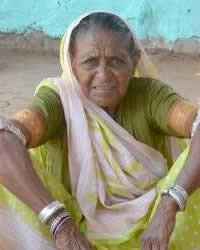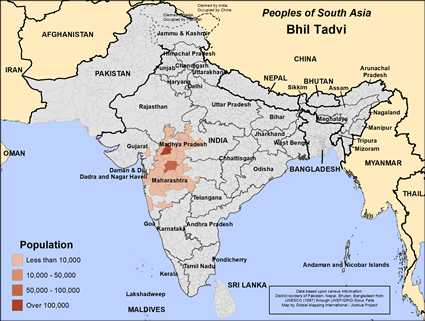Bhil Tadvi in India

Photo Source:
Tantyamama ka Bhil - Wikimedia
Creative Commons
|

Map Source:
People Group data: Omid. Map geography: UNESCO / GMI. Map Design: Joshua Project
|
| People Name: | Bhil Tadvi |
| Country: | India |
| 10/40 Window: | Yes |
| Population: | 472,000 |
| World Population: | 472,000 |
| Primary Language: | Dangi |
| Primary Religion: | Hinduism |
| Christian Adherents: | 0.06 % |
| Evangelicals: | 0.00 % |
| Scripture: | New Testament |
| Ministry Resources: | Yes |
| Jesus Film: | Yes |
| Audio Recordings: | Yes |
| People Cluster: | South Asia Tribal - Bhil |
| Affinity Bloc: | South Asian Peoples |
| Progress Level: |
|
Introduction / History
The Tadvi Bhil are an indigenous, agricultural people who are subset of the larger Bhil group. The word Tadvi means "one who taps the palm tree." The Tadvi live in the forests of the Indian central Indian state of Madhya Pradesh and the west state of Maharashtra. The majority of Tadvi are Hindus but at least 10% are Muslims. The Tadvi are listed as a scheduled tribe meaning that certain public jobs and university spots are reserved for them. The Tadvi have their own language of Dangi. Many Tadvi are learning to speak Hindi and Marathi so they can communicate with other peoples. A Dangi New Testament was completed in 2017. The gospel will need to be presented to most Tadvi in oral or visual forms.
What Are Their Lives Like?
The main livelihood of the Tadvi Bhil is farming. They grow wet rice as their primary crop. Cotton, peanuts and barley are cash crops. Most families own a small plot of land, but they spend most of their time cultivating land owned by others. Fishing and hunting supplement their diet. As Hindus, they will not eat beef. The Tadvi marry within their group but not within their particular clan. Families arrange marriages with the girls often being married in their early teens. The newly married couple lives with the groom's family until they can afford to build their own house. Sons inherit the father's property. They build their houses from bamboo and mud. Having a tile floor and not a dirt one is a sign that the family is relatively wealthy. Most Tadvi live in villages composed of other Tadvi Bhil. Village priests and elders preside at important family ceremonies such as births, weddings and funerals.
What Are Their Beliefs?
The large majority of Tadvi practice Hinduism, the ancient religion of India. They worship and serve the gods of the Hindu pantheon. Hindus believe that by performing rituals and good works that they will attain moksha or freedom from the endless cycle of birth, death and rebirth. The Tadvi visit Hindu shrines and offer prayers, food, flowers, and incense to their gods in hopes of gaining protection and benefits. They do not have a personal or familial relationship with their gods as Christians do. There are many forms of Hinduism, each with its own deities and beliefs. Along with Hinduism, the Tadvi believe that spirits inhabit the objects of nature. The Tadvi believe that they must appease these evil spirits. The main yearly holidays of the Tadvi people are Holi, the festival of colors and the start of spring, Diwali, the festival of lights, Navratri, the celebration of autumn and Rama Navami, Rama's birthday. The caste system divides Hindus into four main categories. The lowest communities are outside of the caste system. As a tribal people, the Tadvi are deemed outside the caste system and given low status.
What Are Their Needs?
The Tadvi need good schools for their children. Many of the adults need to learn new job skills. Medical teams can bring the benefits of modern medicine to Tadvi villages. Most of all the Tadvi need to hear and understand the life-changing message of Jesus Christ. He alone can forgive their sins and grant them eternal life.
Prayer Points
Ask the Lord of the harvest to send forth laborers to live and work among the Tadvi Bhil of India. Ask God to raise up prayer teams who will begin breaking up the soil through worship and intercession. Pray for effectiveness of the JESUS Film among the Tadvi Bhil. Ask the Holy Spirit to soften the hearts of the Tadvi Bhil so they will be receptive to Jesus Christ. Pray for a disciple making movement to flourish among them, causing their society to improve dramatically.